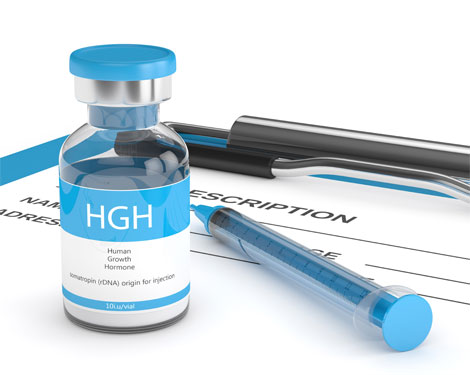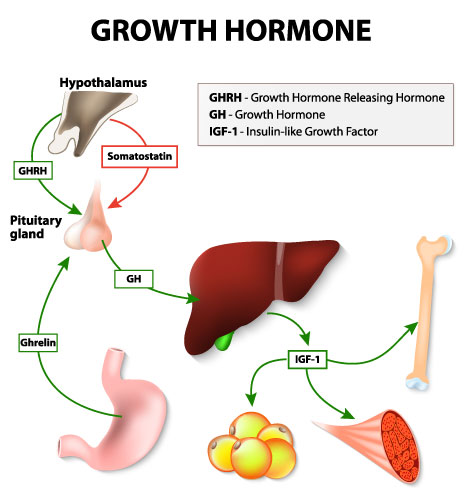Get Started
Complete the short form belowto Contact a Nexel Medical physician

Human Growth Hormone (HGH) is a potent hormone made in the pituitary gland. Also known as somatotropin – peptide hormone, HGH stimulates growth and cell reproduction that helps influence height as well as building bones and muscles. The hormone’s primary function is to help with processing proteins and increasing fat breakdown to help provide the energy needed for tissue growth.
According to the US National Library of Medicine of the National Institutes of Health, this potent hormone has a wide range of biological effects. Levels of HGH in your body change throughout the day depending on your physical activity, sleep, stress and low blood sugar. Like any drug or injectable element, its uses can be extremely beneficial, but its abuses should also be addressed.
HGH was originally used to treat the condition of a pituitary dwarf. Approved uses has since grown to encompass children as well as adults with a variety of conditions. These include:

All the above have been supported by double-blind controlled studies among other rigorous scientific studies. Additional possible uses have been proposed and are either under study or are used as treatments because of their observed effects. These include:
[ten-button-menu type=’first’]
The last two treatments indicate the areas HGH can be abused. The classic example of athletes and body-builders who use steroids are now turning to HGH hoping to benefit from its anabolic effects without suffering the egregious side effects of the steroids. HGH gives athletes an unfair advantage over their competitors, however. Because it is at least as powerful as steroids, it should be banned from sports, though testing for it remains problematic.
No evidence exists of HGH’s benefits for the elderly at this time either. This example as well as use of HGH in children of normal height should be considered abuse of HGH. These uses are outside the established indication of the hormone and should be considered abuse especially in lieu of the potential side effects.
Like any ingested or injected substance, HGH has the potential for significant side effects. These possibilities should be carefully considered and weighed against the desired outcome of use. Possible conditions include:
Many of these side effects occur with high doses of HGH, so studies are underway to check effectiveness of lower doses, hoping to reap benefit without the corresponding negatives.
[ten-button-menu type=’second’]
Legitimate use of synthetic HGH is indicated for children and adults suffering from growth hormone deficiency. Symptoms of deficiency include:
A combination of several symptoms indicates the need for blood work to look for possible growth hormone deficiency.
Natural growth hormone (GH) circulates in the blood and dissipates rapidly so blood work may not be effective in determining if GH levels are low. Your doctor will most likely conduct a “GH stimulation test” on an outpatient basis to determine your levels.
According the Medical News Today, injections of synthetic HGH are the most common form of treatment. The synthetic HGH is designed to mimic the behavior or natural HGH in your body. Injections can be self-administered or given to you by your doctor in set prescribed amounts. Because treatment can last for several years, your doctor will periodically do blood work to check HGH levels, cholesterol and blood sugar levels, and bone density. Treatment varies and is based on a person’s;
Goals of treatment include:
You should not take HGH injections if you have any of the following:
Combining HGH injections with a balanced and healthy lifestyle maximizes the treatment potential. A balanced diet, plenty of sleep and exercise, and following medical advice gives individuals with HGH deficiency a greater chance at a normal, productive life.
Complete The Short Form Below To Contact a Nexel Medical Physician
